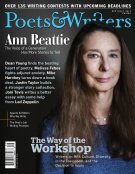Shadowboxing: A Faculty Panel on the Intersections of Culture and Craft
What follows is a curated selection of the most salient topics of the discussion, organized by the MFA Program for Writers at Warren Wilson College, which took place on the campus near Asheville, North Carolina, on Friday, July 3, 2015.
POC in the MFA: Responding to Junot Díaz’s post
C. Dale Young: Nothing that Junot says in his post is remotely new to a writer of color—it is not, sadly, revolutionary; it is not shocking. For me, reading it, one thing that struck very close to home was how many things he brought up to which I could so easily say, “Well, yeah, of course.” And yet I had so many white friends who seemed completely shocked and flabbergasted by the article. I never read a writer of color in graduate school. And even now, when I open an anthology, I rarely ever find a Latino writer or an Asian American writer or an African American writer.
[The article] reinforced for a lot of writers of color this sensation that we live in two worlds: a world that we know, and a world where people have no concept of the actual things that we see all the time. It became very clear to me that the world writers of color live in is unseen.
Lan Samantha Chang: I think Junot and I are in almost the exact same generation. When we were kids, there weren’t many people of color in MFA programs. When I asked about it in my own program, someone said to me, “Oh, I don’t count these things.” But I counted.
A. Van Jordan: [As] you’re reading as a student you’re constantly trying to identify yourself…in terms of race, or just simply through experience…. If you don’t see yourself in the literature, you think, “Why am I here? Why am I trying to do this?” If you don’t see someone who’s had the same experience—whether it’s being an affluent African American, or from a poor rural Appalachian white community—you still want to see yourself.
Grappling With Craft and Culture
David Haynes: For me, it’s moments like Ferguson. People are being shot down in the street. I would describe what I do—for a long, long time—is write these comedies of manners that expose the foibles of daily lives of ordinary African Americans. Do I continue doing that when people are being shot down in the street?
Monica Youn: There’s this sense that if I mention kimchi in my poem, all of a sudden, I’m an ethnic writer. I myself have been trying to resist the impulse to “whitewash” my work. Do I take kimchi off the table? It’s hard for me to divorce form from subject matter, or at least image. The idea that there’s a refuge from politics in the poem is strange.
I’ve been thinking lately about what it means to “write Asian American.” If I don’t include markers, does it mean that I’m “writing white”? How do I write about Asian characters without specific markers? If I don’t do that, am I “writing white”?
Young: I get shoved into lots of boxes. I come from a very not-odd background if you’re from Latin America or the Caribbean: I’m part Indian (South Asian), part Chinese, and I’m also Hispanic. My mother’s English—as white as you can get. It’s hard for me to be against white people or reactive to anything, because then I’d feel reactive to some part of myself. There can be a sense that I’m not Asian enough, I’m not Latino enough.
This doesn’t come up much when I’m in the process of writing, when I’m actually drafting, but where it comes back up is in the revising. Do I want to highlight that, do I want to revise that?
Haynes: For me, it’s the “black enough” question. For the very first story I published, the editor...called me up on the phone and said, “I really like this story...but before I accept it I need to ask about your culture.” It was pretty clear in the conversation that if I gave the wrong answer, he wasn’t going to publish it. Because the characters in the story were African American, I think that if it [had been] written by a white writer, he wouldn’t have published it.
Everybody has an identity—we all have to think about it. But there’s this imposed voice up here, outside of me, that I have no control over, that’s doing this additional defining. How do I interact with it? Do I ignore it? Do I engage it? How do you do that and still get the work done?
Historical Origins of the “Identity vs. Text” Debate
Haynes: The whole idea of being cautious and careful about who you speak for, and not trespassing on other people’s cultural territories, comes out of [historical] changes in cultural anthropology. Simultaneously there were the influences of Marxist analysis in terms of capital and control of cultural products, in terms of who owns what story, and also the profits and cultural capital, and the idea that “since that belongs to that community, I can’t have a part of it. That’s their cultural capital, and it’s hands-off.”
These ideas became very deeply entrenched in literary studies. [Over] here we have writers who say it’s all about text and what’s on the page only. And writers over here saying that it’s all about identity and experience. That conversation has never been reconciled. So we see that tension present in how work is reviewed and discussed—“This isn’t poetry, it’s identity politics.” Or, “If I’m going to be taken seriously as a poet or a fiction writer, I’ve got to abandon identity and focus on other things.”








